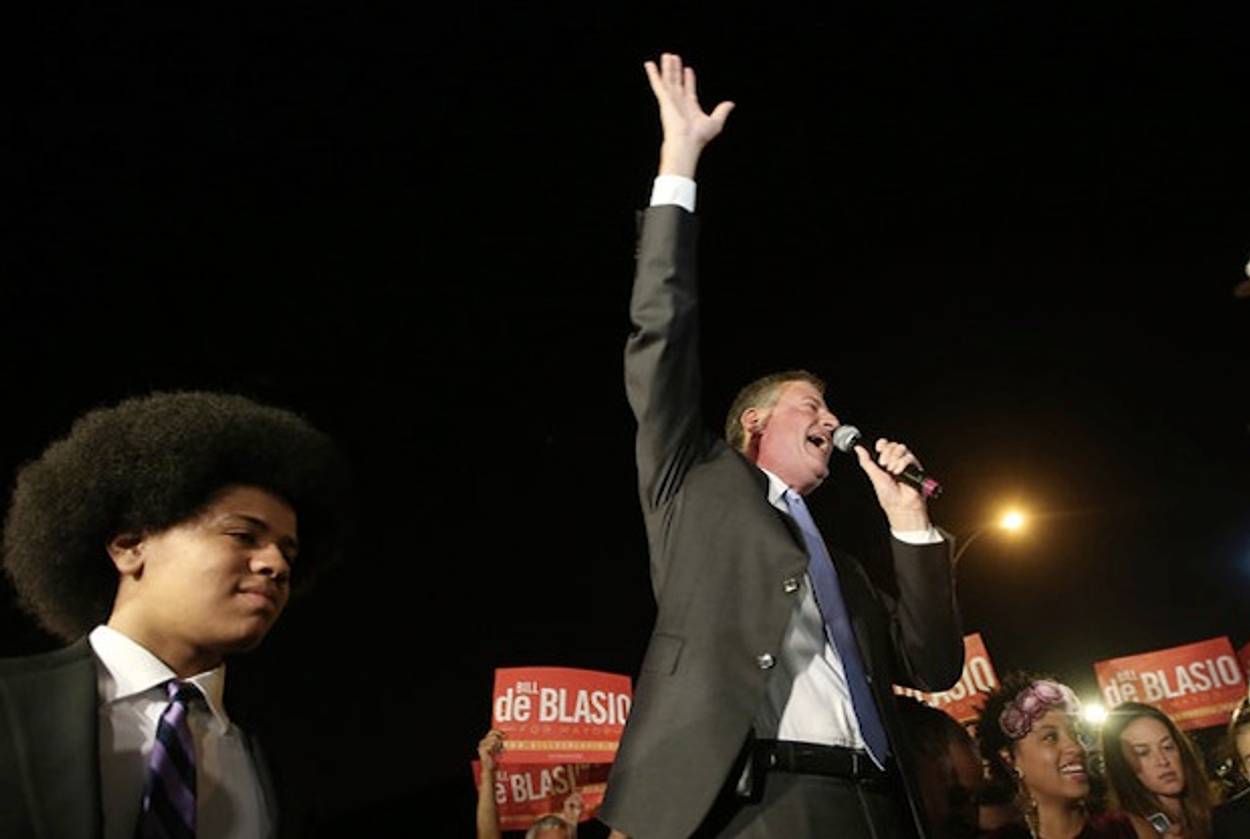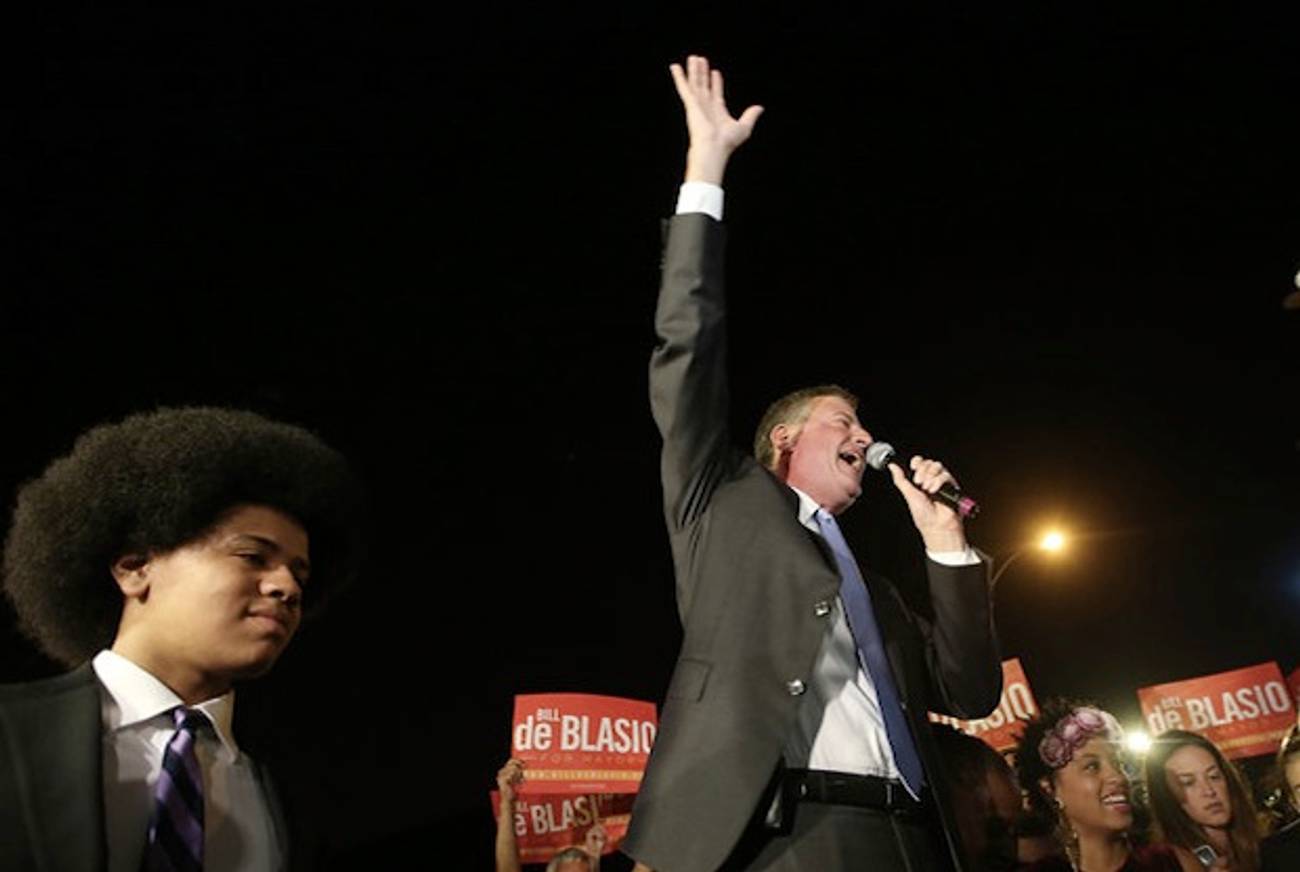Dante, The East River, East Room, & Middle East
Last night’s mayoral primaries and the Obama speech on Syria




Shortly after midnight, Bill de Blasio, strode out onto the stage at the Bell House, a dance-club-cum-concert-venue within scent range of the toxic Gowanus Canal and industrial Brooklyn, to declare victory in the New York City Democratic mayoral primary. Though it appeared he was running just north of the 40% threshold required to win the primary without a runoff, precinct numbers were still trickling in and de Blasio’s remaining primary opponent, Bill Thompson, had already forsworn surrender. “Three more weeks,” he and his supporters shouted, referring to the October 1 runoff date.
De Blasio, who had championed himself as the insurgent progressive, opted against a Howard Dean yawp and pivoted immediately with downcast eyes to bathos. He invoked the anniversary of September 11th, which had arrived as the crowd noshed on schnitzel and ginger shallot pretzel bread heroes and waited for de Blasio to take the stage. With Thompson refusing to concede, the crowd would disperse without knowing for sure if their man had won outright or if there would be a “Battle of the Bills” ahead.
Meanwhile in Manhattan, Joe Lhota, the Republican primary winner, had already started chucking rocks at de Blasio, calling his “Tale of Two Cities” campaign theme divisive and declaring that he would carry the Bloomberg torch, specifically naming stop-and-frisk.
Just hours earlier, the wayward specter of a Anthony Weiner/Eliot Spitzer power nexus had been put to rest by some 600,000 New York voters, who were no doubt sick of talking about it. In one final indignity, word had quickly spread that Weiner’s sexting partner Sydney Leathers had crashed Weiner’s campaign party to finally meet the man whose campaign had nosedived from a high of 26% in summer polls to a final tally of less than 5%.
Leathers, in a short red dress, reportedly waited to confront Weiner outside the midtown bar and, thinking quickly, Weiner’s staff spirited him through an adjacent McDonald’s and the bar’s back door with Leathers and the press chasing him. In his concession speech, Weiner confessed that he had been an “imperfect messenger” even if he did have the best ideas. The imperfect messenger did not thank his wife. Meanwhile, Eliot Spitzer, who fell to Scott Stringer in the comptroller race, was on and off the stage at his election party in less than two minutes.
Also speaking briefly and grimly was President Barack Obama, who addressed the nation from the East Room of the White House. Though the tumble toward American military action on Syria had been held at bay by the sudden and suspicious rectitude of Russia, the President talked about a strike in strategic and highly moral terms, referencing the gassing of innocent people, assuring there would be no American boots on the ground, allowing that Israel could defend itself, and reminding Bashar Assad how pitiful his military is. He referred to both the atrocities of the Great War’s trenches and the Nazi slaughter of the countless, which involved chemical weapons. Standing in the middle, he called out to the jokers and the clowns.
“And so to my friends on the right, I ask you to reconcile your commitment to America’s military might with a failure to act when a cause is so plainly just.
To my friends on the left, I ask you to reconcile your belief in freedom and dignity for all people with those images of children writhing in pain and going still on a cold hospital floor, for sometimes resolutions and statements of condemnation are simply not enough.”
The war table then set, President Obama got up from it and spoke of his hope for diplomacy to prevail. After all, American power had led Syria to declare its chemical weapons program and agree to sign the international convention on chemical weapons.
The speech was praised by pundits, some of whom lauded him for stumbling into a solution. Others were doubtful that diplomacy would work. Senators John McCain and Lindsey Graham issued a joint statement approving the speech, but rebuking President Obama for not promising to help the moderate factions of the Syrian resistance. Others yet, like Senator Rand Paul, declared victory offering that “The chance for diplomacy would not have occurred without strong voices against an immediate bombing campaign.”
The speech over, President Obama turned and went away. The local broadcasts went back to the mayoral election coverage and the season finale of “So You Think You Can Dance?” A dancer from each gender, Amy and Fik-Shun, were named the season’s winners. In a post-show interview, Fik-shun raved after besting Aaron, who had been the season favorite to win:
“I’m just soooooooo, so happy. Honestly, I was expecting to be second, because I was in the bottom once. A lot of things went through my head…but at the end of the day, I put it all on the dance floor. It was never like, Aaron this or me that. We were in it together.”
We all are.
Adam Chandler was previously a staff writer at Tablet. His work has appeared in the New York Times, the Wall Street Journal, the Atlantic, Slate, Esquire, New York, and elsewhere. He tweets @allmychandler.